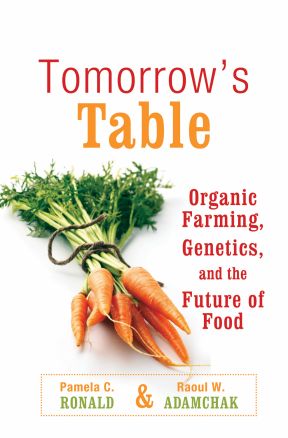Energy consumption is changing. Governments and businesses around the world are exploring low carbon options including biofuels, natural gas and wind in an attempt to achieve longstanding energy security. Production of new sources has led to controversies about economic and environmental impacts and the trade-offs they generate between food and fuel production, energy security and environmental quality.
The post How much do you know about sources of energy? [quiz] appeared first on OUPblog.
It's 1963, and in the small town of Medley, Cully Pennyacre's summer is about to get more complicated than he ever imagined possible. With his dad on a world-traveling hiatus and his family's apple farm losing financial ground, Cully takes on an apprenticeship that ends up adding more to his life than just a little extra cash.
Click here to read my full review.
Pamela C. Ronald is a Professor in the Department of Plant Pathology at the University of California, Davis and the co-author with her husband Raoul Adamchak of Tomorrow’s Table: Organic Farming, Genetics, and the Future of Food which argues that a judicious blend of two important strands of agriculture–genetic engineering and organic farming–is key to helping feed the world’s growing population in an ecologically balanced manner. In the post below Ronald responds to an editorial by Paul Krugman.
“Most Americans take food for granted”, reports the New York Times in an editorial last week. I would add that we also take abundant water, vast expanses of wilderness and clean air for granted. The price of oil, global warming and skyrocketing food prices are changing the way we think about land. It is about time. Have we forgotten that land and its resources are precious? Have we forgotten how to be good stewards?
I n an editorial this week in the NYT, Paul Krugman places part of the blame on biofuels: “We need to push back against biofuels that turns out to have been a terrible mistake.” But this conclusion is premature and overly simplistic.
n an editorial this week in the NYT, Paul Krugman places part of the blame on biofuels: “We need to push back against biofuels that turns out to have been a terrible mistake.” But this conclusion is premature and overly simplistic.
Whether biofuels offer carbon savings depends on how they are produced. If we destroy rainforests and grasslands to plant food crop–based biofuels, then Kurgman is right. This is a bad idea. Such an approach would release 17 to 420 times more CO2 than the annual greenhouse gas (GHG) reductions that these biofuels would provide by displacing fossil fuels. (Fargione et al, science 2008).
In contrast, biofuels made from waste biomass or from biomass grown on degraded and abandoned agricultural lands planted with perennials (so called cellulosic biomass) incurs little or no carbon debt and can offer immediate and sustained GHG advantages. Research on cellulosic biofuels have only just begun and there are tremendous opportunities. For example, plant biologists are working towards developing new and more productive non-food crops that can be grown on marginal lands. If we triple the yield of biomass we can use 1/3 less land. If we use the most ecologically responsible farming practices available (e.g. organic farming) to produce this new crop biomass, we can reduce the environmental impacts.
Nathanael Greene in an interview with Ira Flatow on Science Friday today said we need new innovations and we need to use them smartly. That is what should be done.
ShareThis







so lovely!
Nice colors and couldnt tell it was digital.
I especially like the girl's face. The expression conveys the mood perfectly.
wonderful....I love the birds' nest in her braid...you always add a bit of the unexpected !! :)
Oh- great choice! Wouldn't locks of love be tickled to get her hair...
Outstanding! Very appealing, colorful!
Aw it's lovely, I love her facial expression and the little bird, beautiful.
great !!!
A great story and a great illustration to go with it!
Rapunzel is one of my favorite characters, and you have created her most enchantingly! I love the flowers and birds and the nest in her hair, and the cute little mouse peeking out from the tower wall. At least she has some good company while she waits for her prince!
Beautifully done! Love the bird nesting in her hair. Lovely!
Love that new banner too! Great stuff, Ginger!
the birds may have nest in her hair now but i see that lil white mice eyeing a place to make a home in her a hair too.
I always love your whimsical, sweet illustrations - this is just perfect for the topic - love it Ginger!!
I really appreciate the softness you have going here....
she is soooooooo dear... and gentle... like
Hey, that's pretty extreme! Very nice, Ginger!